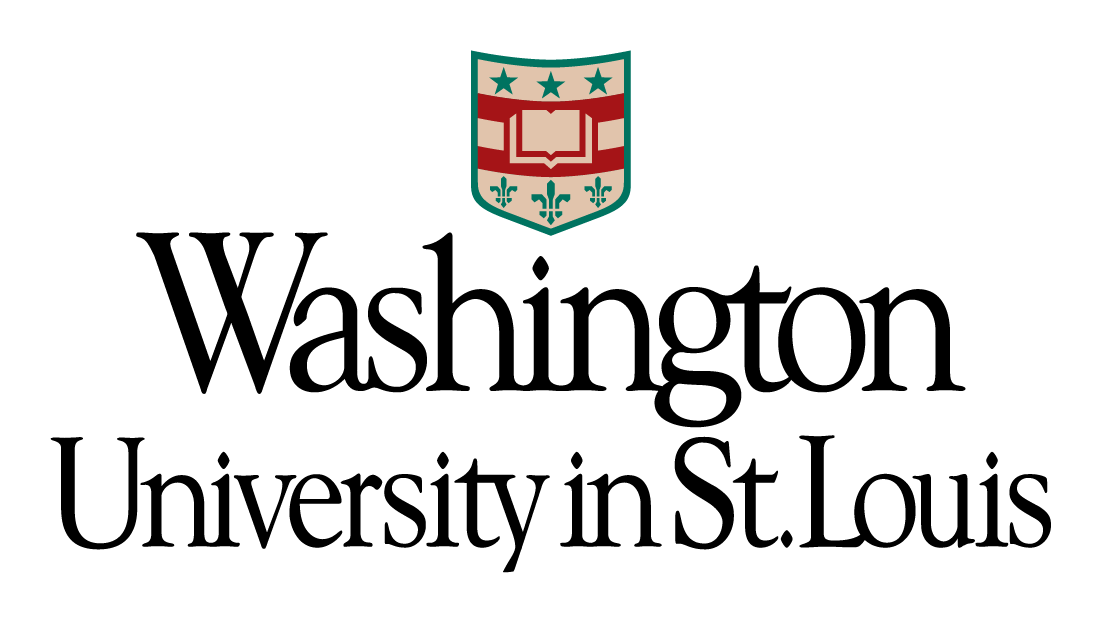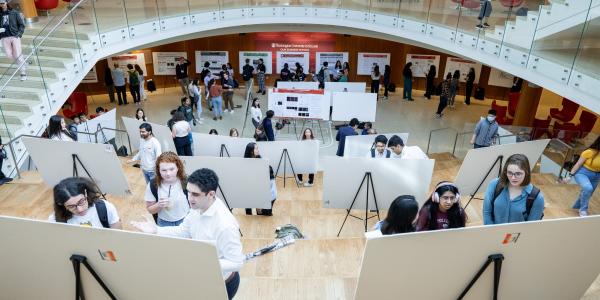The Office of Undergraduate Research (OUR) hosts Undergraduate Research Symposia twice a year, showcasing the diverse range of research, creative inquiry and experiential learning projects conducted by WashU undergraduate students and mentored by WashU faculty. The symposia provide an opportunity for undergraduate students to share their work, engage in peer networking and cross-disciplinary conversations, and develop presentation skills. All WashU community members are encouraged to attend!
Presenter list and searchable online program
Event Schedule & Location
Special presentations
Location: Bauer Hall (BH), Emerson Auditorium
10:00AM - 11:15AM: Featured Senior Talks and presentation of Undergraduate Inquiry Mentor Impact Award
Faculty-nominated seniors giving featured talks include:
- Kate Bircher, Philosophy-Neuroscience-Psychology & Dance
- Bonnie Dana, Studio Art & Environmental Analysis
- Maxwell Juhas, American Culture Studies
- Sophie Waimon, Anthropology: Global Health and Environment
Inaugural Undergraduate Inquiry Mentor Impact Award recipients (alphabetical):
- Jami Ake, Teaching Professor Interdisciplinary Project in the Humanities, and Women, Gender, and Sexuality Studies
- Melissa Mavers, Assistant Professor of Pediatrics, Hematology, and Oncology
- Tim Wencewicz, Associate Professor of Chemistry
Poster presentations
Location: Bauer Hall (BH), Frick Forum
10:00AM - 11:30AM: Poster session A
12:45PM - 2:15PM: Poster session B
3:30PM - 5:00PM: Poster session C
Each poster session includes a mix of all participating disciplines, grouped thematically as much as possible.
Oral presentations
Location: Bauer Hall (BH), rooms 160 and 150 (concurrent sessions)
12:00PM - 1:00PM: Lightning Talks 1 (BH 160) - Perception and Lived Experience (Social Sciences and Humanities)
12:00PM - 1:00PM: Lightning Talks 2 (BH 150) - Biology of Disease
1:45PM - 3:15PM: Deeper Dive Talks 1 (BH 160) - Theoretical and Computational Sciences
1:45PM - 3:15PM: Deeper Dive Talks 2 (BH 150) - Center for the Humanities roundtable on People + Place
4:00PM - 5:00PM: Lightning Talks 3 (BH 160) - Power, Ethics, & Justice in Society (Social Sciences and Humanities)
4:00PM - 5:00PM: Lightning Talks 4 (BH 150) - Public Health
Virtual/recorded presentations
A selection of recorded presentations will be available in the online program only, allowing us to exceed in-person capacity limitations and include students unavailable in person (e.g., current study abroad students).
Directions
Enter through Bauer Hall and turn left to access the central staircase. Proceed to the bottom floor. The information table will be on your right.
Parking: The closest visitor parking to the Symposium venue is Millbrook Garage. Cross Throop Drive after exiting Millbrook and proceed to Knight Hall (not to be confused with the Knight Center). The information table will be on the right as you enter Knight Hall.
Key Dates for Presenters
- Friday, February 16: Registration opens. Registration is required for all symposium participants. If your course or department requires that you present at the symposium, you must register; no students are automatically registered.
- Wednesday, March 13: Registration closes
- Friday, March 22: Participants notified of session assignment
- Friday, March 29: Deadline for presenters to confirm participation
- Friday, April 12: Submission deadline - final title, abstract, and presentation file for online program due *
- Friday, April 19: Symposium from 10 AM - 5 PM (exact times subject to change) on the 1st floor of Bauer Hall (various locations)
Faculty mentors will be emailed upon submission of the registration form to notify them of students' participation and, for mentors of seniors, to invite them to nominate students for the featured talks.
* All presenters must submit a presentation file (e.g., PDF of poster, slides, or exhibit) for the online program. This file will be VISIBLE TO THE PUBLIC as submitted, so it is critical for students to discuss their submissions with their faculty mentors. If there are IP concerns and information cannot be publicly disclosed, students may submit a placeholder file to the online program (e.g., a visual abstract or poster with sensitive information blinded) and coordinate with the OUR to print (if applicable) and present their materials in person.

